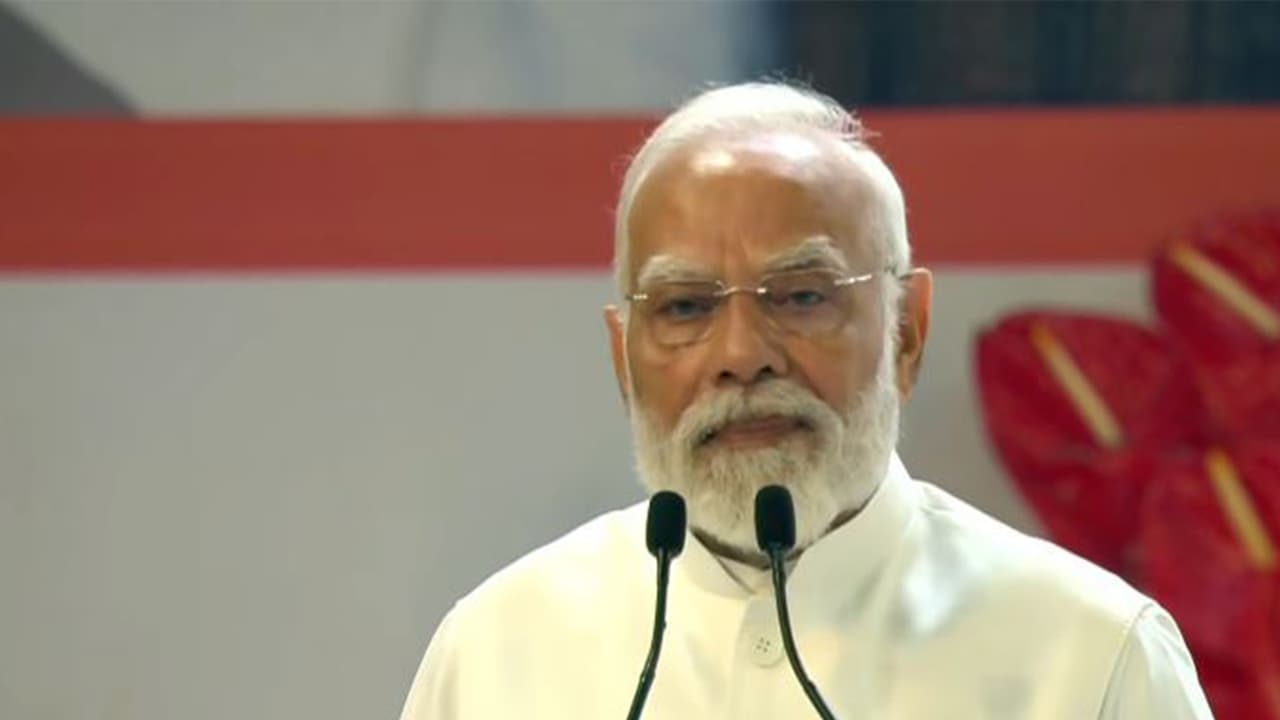PM Modi launched year-long celebrations for the 150th anniversary of Vande Mataram, calling the national song a ‘mantra, energy, dream, and resolve’. He released a commemorative stamp and coin and participated in a mass singing event.
PM Modi’s Address on Vande Mataram’s 150th Anniversary
Prime Minister Narendra Modi on Friday described India’s national song, Vande Mataram, as a “mantra, energy, dream and resolve,” while leading the nation in commemorating 150 years of its creation. Addressing a grand event marking the occasion, the Prime Minister said the song embodies devotion and worship for the motherland and continues to inspire generations with a sense of patriotism and pride.
“Vande Mataram, these words are a mantra, an energy, a dream, a resolve. Vande Mataram, these words are devotion and worship to Maa Bharti. Vande Mataram, these words take us into history, they fill our present with new confidence, and they give our future this new courage that there is no resolve that cannot be achieved, no goal that we, the people of India, cannot attain,” Prime Minister Modi said. “Aisa koi sankalp nahi, jiski siddhi na ho sake. Aisa koi lakshya nahi, jo hum bharatwasi paa na sakein,” the PM added.
The Power of Collective Singing
PM Modi described the collective singing of Vande Mataram as “an experience beyond expression,” capturing the unity and emotion of the nation. He said, “The collective singing of Vande Mataram is an experience beyond expression. In so many voices, one rhythm, one tone, one emotion, the same thrill and flow, such energy, such a wave, has stirred the heart. This magnificent experience of the collective anthem Vande Mataram is truly beyond expression. In so many voices, one rhythm, one tone, one emotion, one kind of thrill, one kind of flow, such harmony, such waves… this energy has made the heart pulsate.”
Year-Long Commemoration Launched in New Delhi
Calling November 7 a “historic day,” the Prime Minister said the 150th year of Vande Mataram is a moment of pride that will “fill crores of Indians with new energy.” “Today, November 7, is a historic day. We are having a grand celebration of 150 years of the creation of Vande Mataram… This event will generate new energy among crores of Indians… My greeting to every citizen on the 150th anniversary of Vande Mataram,” PM Modi stated.
Prime Minister Modi also paid homage to the freedom fighters who devoted their lives to the ideals enshrined in the song. “I pay my humble obeisance today to the millions of great souls of the nation, the children of Mother India, who devoted their lives to ‘Vande Mataram’, and extend my heartfelt congratulations to my fellow countrymen,” he stated.
Prime Minister Narendra Modi on Friday inaugurated the year-long commemoration of the National Song “Vande Mataram” at the Indira Gandhi Indoor Stadium in New Delhi. The Prime Minister also released a Commemorative Stamp and Coin on the occasion.
Prime Minister Modi also launched a portal commemorating the 150th anniversary of the National Song ‘Vande Mataram’. The celebrations featured a mass singing of the full version of “Vande Mataram” across public places, with participation from citizens across all segments of society, in conjunction with the main programme.PM Modi also participated in the mass singing of the full version of ‘Vande Mataram’ at the Indira Gandhi Indoor Stadium.
Union Minister Gajendra Singh Shekhawat, Delhi Lieutenant Governor Vinai Saxena and Delhi Chief Minister Rekha Gupta were also present on the occasion. This programme marks the formal launch of a year-long nationwide commemoration, from November 7, 2025, to November 7, 2026, celebrating 150 years of this timeless composition, which inspired India’s freedom movement and continues to evoke national pride and unity.
History of the National Song
Vande Mataram is a Sanskrit poem written by Bankim Chandra Chattopadhyay in 1876. It was later included in his novel Anandamath, published in 1882, and became a symbol of Indian nationalism during the country’s struggle for independence.
The poem is a hymn to the motherland, personifying India as a goddess, and is often translated as “Hail to the Motherland”. The song has been a source of inspiration for many Indians and is considered one of the most iconic expressions of patriotism in the country. (ANI)
(Except for the headline, this story has not been edited by Asianet Newsable English staff and is published from a syndicated feed.)
